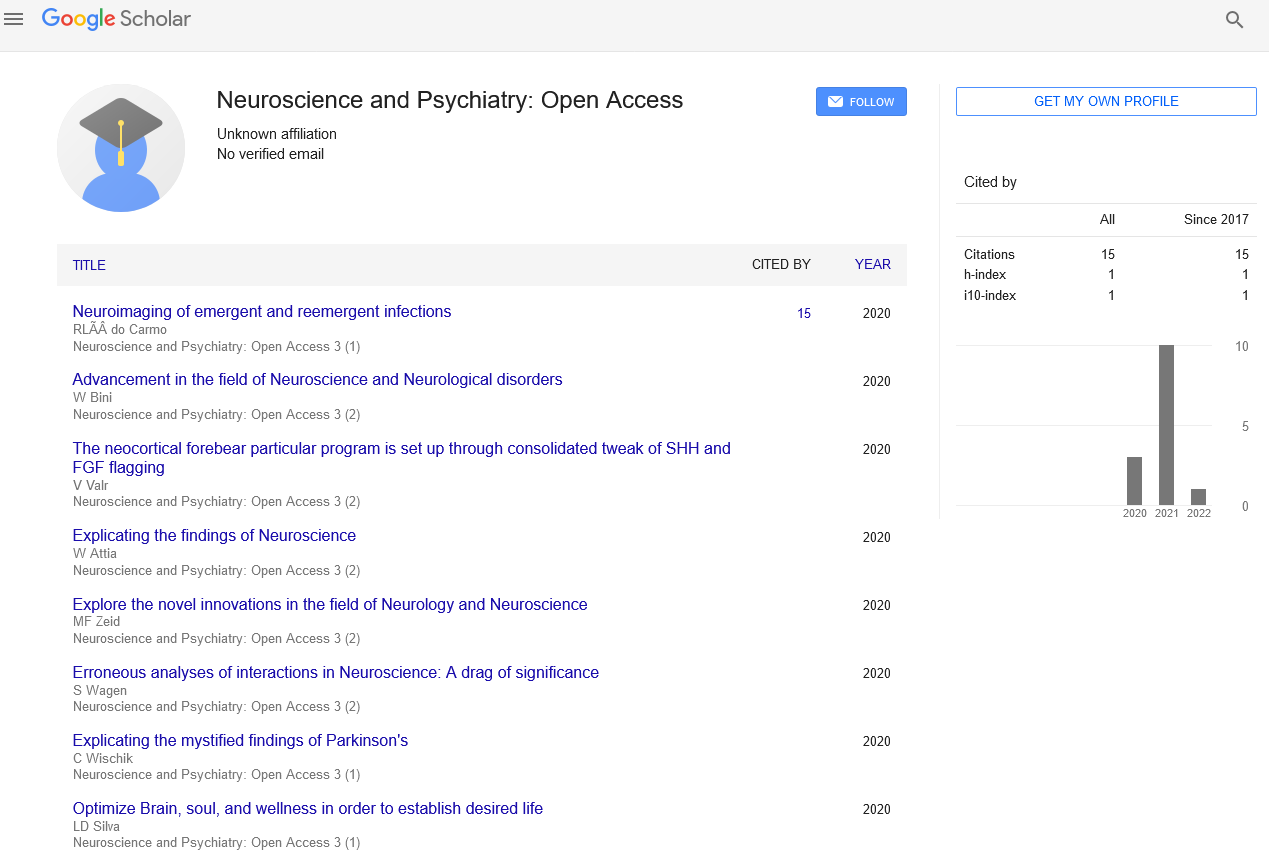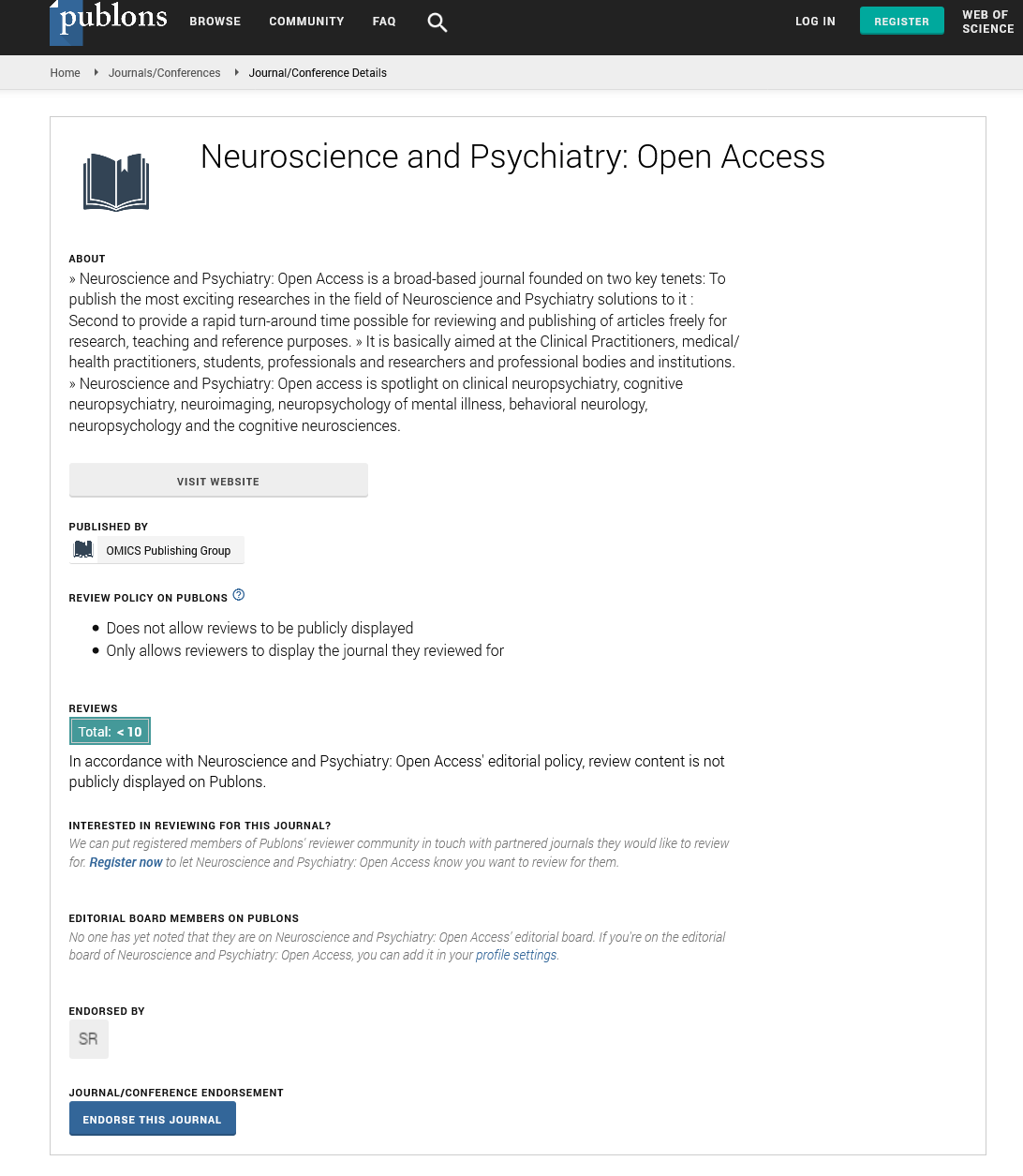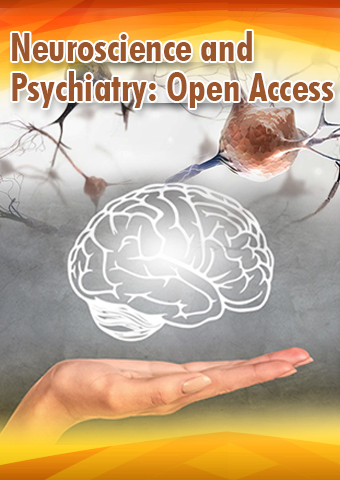Perspective - Neuroscience and Psychiatry: Open Access (2024) Volume 7, Issue 2
Exploring the Intricacies of Neurochemistry: Unveiling the Secrets of the Brain
- Corresponding Author:
- Yasin Janssen
Department of Cognitive Neuroscience, Maastricht University, Maastricht, Netherlands
E-mail: y.janss76@maastrichtuniversity.nl
Received: 06-02-2024, Manuscript No. NPOA-23-119628; Editor assigned: 09-02-2024, PreQC No. NPOA-23-119628 (PQ); Reviewed: 23-02-2024, QC No. NPOA-23-119628; Revised: 06-03-2024, Manuscript No. NPOA-23-119628 (R); Published: 13-03-2024, DOI: 10.47532/npoa.2024.7(2).181-182
Introduction
Neurochemistry, a fascinating and dynamic field within neuroscience, delves into the molecular underpinnings of the brain’s complex functions. By studying the chemistry of neurons and their interactions, neurochemistry unravels the secrets of how the brain communicates, processes information, and influences our thoughts, emotions, and behaviors. In this article, we will explore the captivating world of neurochemistry, shedding light on its key components, functions, and the profound insights it offers into the human brain.
Neurochemistry is concerned with the intricate chemical processes that govern the nervous system, focusing on the following fundamental components. Neurons, also known as nerve cells, are the primary functional units of the nervous system. These specialized cells are responsible for transmitting electrical and chemical signals, enabling communication within the brain and throughout the body. Neurotransmitters are chemical messengers that allow neurons to communicate with one another. These molecules are released from the axon terminals of one neuron and bind to receptors on the dendrites of the next neuron, facilitating the transmission of signals. Key neurotransmitters include dopamine, serotonin, and acetylcholine. Receptors are proteins located on the surface of neurons, and they bind to specific neurotransmitters, initiating various cellular responses. The type and distribution of receptors on neurons play a critical role in determining the brain’s functions.
Description
The neurotransmitter systems
The brain is a highly complex and interconnected organ, and neurotransmitters play a central role in these networks. Different neurotransmitter systems are associated with distinct functions and behaviors:
Dopaminergic system: Dopamine is a neurotransmitter that is vital for motivation, reward, and pleasure. Dysregulation of the dopaminergic system is implicated in conditions like Parkinson’s disease and addiction.
Serotonergic system: Serotonin is involved in mood regulation, sleep, and appetite. It is closely associated with mood disorders such as depression and anxiety.
Cholinergic system: Acetylcholine is a key neurotransmitter involved in learning, memory, and muscle control. Dysfunctions in the cholinergic system are linked to Alzheimer’s disease.
GABAergic system: Gamma-Aminobutyric Acid (GABA) is an inhibitory neurotransmitter that helps regulate neural excitability. Imbalances in the GABAergic system can lead to conditions like epilepsy and anxiety disorders.
Glutamatergic system: Glutamate is the primary excitatory neurotransmitter in the brain. It is involved in memory and learning. Excessive glutamate activity is associated with neurodegenerative conditions like Alzheimer’s disease.
The blood brain barrier
The blood brain barrier is a protective mechanism that separates the bloodstream from the brain and spinal cord. It controls the passage of molecules and ions between the blood and brain tissue, preventing harmful substances from entering the brain. While this barrier is essential for maintaining the brain’s integrity, it can also pose challenges in drug delivery for neurological conditions.
The role of neurochemistry in mental health
Neurochemistry plays a significant role in understanding and treating mental health disorders. Dysregulation of neurotransmitters is often associated with conditions such as depression, anxiety, and schizophrenia. Antidepressants, anxiolytics, and antipsychotic medications aim to restore the balance of neurotransmitters in the brain.
Neurochemistry and addiction
The field of neurochemistry has provided invaluable insights into the neurobiological basis of addiction. The reward system in the brain, involving dopamine and other neurotransmitters, plays a central role in the development of addictive behaviors. Understanding these processes has led to the development of targeted interventions for addiction treatment.
Neurochemistry and neurodegenerative diseases
Neurochemistry also has a profound impact on our understanding of neurodegenerative diseases, including Alzheimer’s disease and Parkinson’s disease. The accumulation of abnormal proteins, such as beta-amyloid plaques and tau tangles, in Alzheimer’s disease disrupts normal neurochemical processes, contributing to cognitive decline. In Parkinson’s disease, the loss of dopaminergic neurons disrupts the delicate balance of neurotransmitters in the basal ganglia, leading to motor dysfunction.
The promise of future research
Neurochemistry continues to evolve with advancements in technology and research methods. As our understanding of the brain’s chemistry deepens, it opens up possibilities for novel treatments and therapies for neurological and psychiatric disorders. Researchers are exploring targeted drug therapies, gene therapies, and optogenetics to manipulate the brain’s chemical processes for therapeutic purposes.
Conclusion
Neurochemistry is a captivating and everevolving field that allows us to peer into the intricate world of the brain’s molecular processes. Understanding the role of neurotransmitters, receptors, and their associated systems is fundamental to comprehending how the brain functions, as well as how it can go awry in various neurological and psychiatric disorders.
As research in neurochemistry continues to progress, it holds the promise of innovative treatments, early interventions, and a deeper understanding of the human brain’s inner workings. It is a field that not only enriches our knowledge but also offers hope for those affected by neurological and psychiatric conditions.


